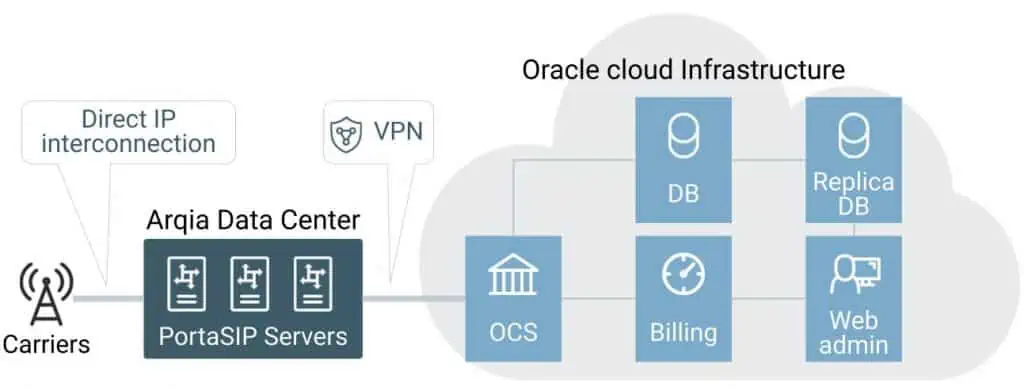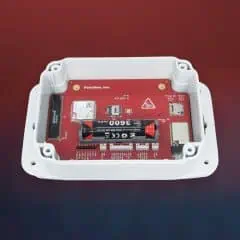Tests prerequisites
Datora, a Brazilan-based telecom services provider, uses an on-premise PortaOne softswitch solution (PortaSwitch) to enable long-distance VoIP calls. The capacity of the PortaSwitch solution was limited by the hardware configuration, which was capable of handling around 450 calls per second (CPS) as a maximum solution capacity. This is much lower than the target performance level of 1000 CPS required by Datora to process the growing traffic of VoIP services. This limits Datora’s ability to increase the number of concurrently served subscribers, and consequently, holds back the revenue streams. Scaling the solution in house with the additional hardware will require capital investments, resulting in decreasing the ROI of the entire solution.
PortaOne approach
To overcome the stated challenge and facilitate the business growth, PortaOne offered Datora to use the hybrid deployment option for the PortaSwitch solution, moving the billing nodes into a public cloud environment and keeping the softswitch SIP servers at the Datora datacenter. This deployment type will allow Datora to maintain the relations with carrier partners due to keeping the IP interconnections on-premise.
SIP calls tests
Having Datora’s approval on the proposed approach, PortaOne deployed the hybrid solution utilizing the Oracle Cloud at the Sao Paulo datacenter for hosting the billing nodes of PortaSwitch and Datora’s local datacenter for hosting the SIP servers. The tested PortaBilling solution contains a cluster of billing nodes. Each node collects all real-time requests from all the network components providing the services and performs AAA of the subscribers through RADIUS or Diameter protocols. Using an additional node increases system performance. Also, PortaBilling includes a MySQL database configured to enable main-secondary data replication.

PortaOne performed the tests using preconfigured ready-to-use scenarios for VoIP calls, including subscriber profiles, tariff plans, etc. The customer simulated the behavior of 6 corporate clients who were making long-distance VoIP calls through SIP trunks, terminated by three VoIP vendors.
PortaOne tested the performance of PortaSwitch using the SIP signaling traffic originated by Datora. The company used SIP traffic generation tool to simulate the behavior of caller and callee parties for predefined call scenarios. PortaOne monitored the number of real-time parameters, such as CPU load average, run-time memory utilization, processing, dispatching, billing nodes load, waits and UDP drops. As the key parameter, PortaOne tracked the number of failed calls. PortaOne monitored the time between sending a request by SIP Softswitch and receiving a response from the Billing Platform. The maximum load on PortaSwitch was determined when the time took more than 5 seconds.
Test results and benefits
The tested hybrid PortaSwitch solution showed the maximum performance level of processing 1270 CPS, exceeding Datora’s requirement of 1000 CPS. At this load level, the MySQL database performance becomes a bottleneck of the entire PortaSwitch system. To overcome this limitation, it is necessary to select a cloud shape for the MySQL database configuration capable of processing bigger loads.
The table below shows how the number of concurrent calls changes depending on the call duration (ALOC) and ASR values at the achieved performance level. The number of concurrent calls is the product of the calls per second (CPS), call duration and ASR.
| CPS | Call duration (ALOC), sec | ASR, % | Number of concurrent calls |
|---|---|---|---|
| 1270 | 60 | 25% | 19.05 |
| 1270 | 60 | 50% | 38.1 |
| 1270 | 300 | 25% | 95.25 |
| 1270 | 300 | 50% | 190.5 |
The Communication Service Providers will benefit from utilizing the hybrid environment for PortaSwitch deployments based on the Oracle cloud in multiple ways:
- Enable long-distance VoIP calls with a proven hybrid cloud solution designed and tested to support 1270 calls per second;
- Eliminate the need to invest in hardware and collocation expenses to scale the billing nodes’ components and increase the solution performance;
- Maintain the carrier relations and switching settings for IP calls unchanged due to possibility of keeping the SIP servers on-premise.


















